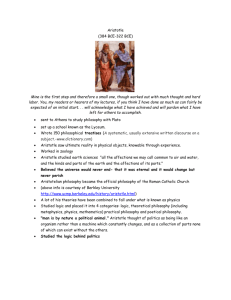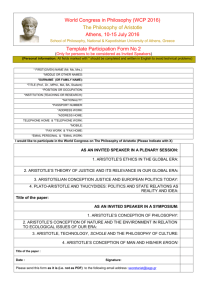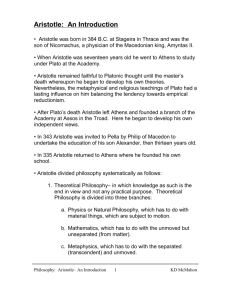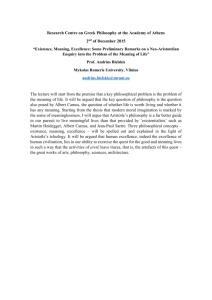Dear Colleagues, On the occasion of 2400 years since the birth of
advertisement
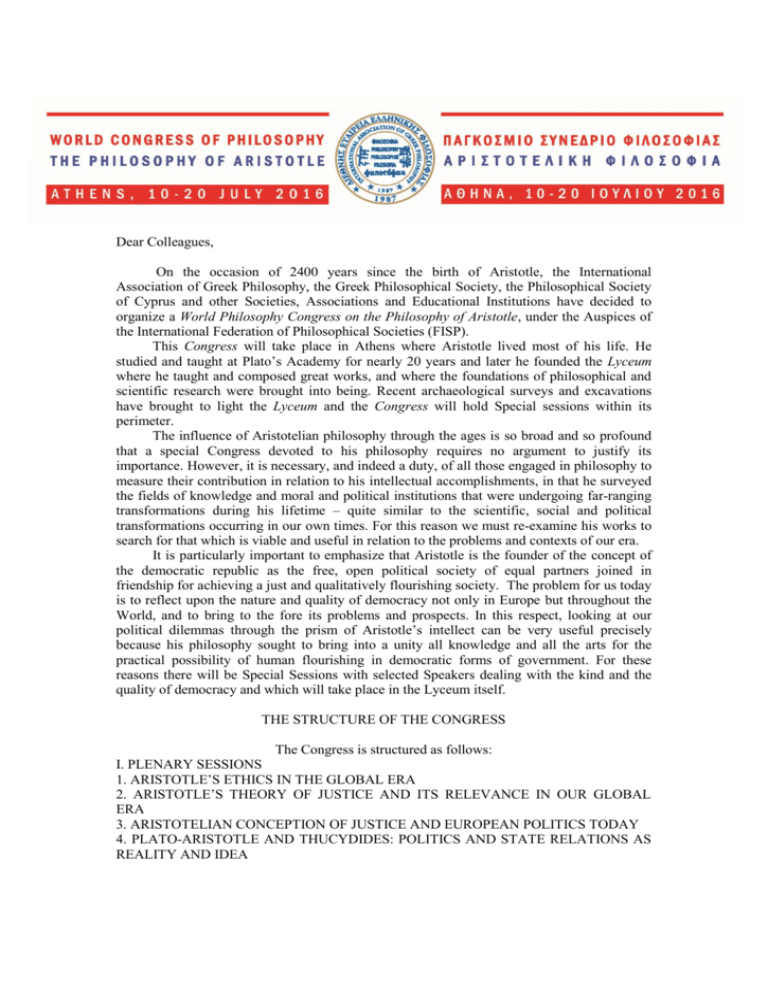
Dear Colleagues, On the occasion of 2400 years since the birth of Aristotle, the International Association of Greek Philosophy, the Greek Philosophical Society, the Philosophical Society of Cyprus and other Societies, Associations and Educational Institutions have decided to organize a World Philosophy Congress on the Philosophy of Aristotle, under the Auspices of the International Federation of Philosophical Societies (FISP). This Congress will take place in Athens where Aristotle lived most of his life. He studied and taught at Plato’s Academy for nearly 20 years and later he founded the Lyceum where he taught and composed great works, and where the foundations of philosophical and scientific research were brought into being. Recent archaeological surveys and excavations have brought to light the Lyceum and the Congress will hold Special sessions within its perimeter. The influence of Aristotelian philosophy through the ages is so broad and so profound that a special Congress devoted to his philosophy requires no argument to justify its importance. However, it is necessary, and indeed a duty, of all those engaged in philosophy to measure their contribution in relation to his intellectual accomplishments, in that he surveyed the fields of knowledge and moral and political institutions that were undergoing far-ranging transformations during his lifetime – quite similar to the scientific, social and political transformations occurring in our own times. For this reason we must re-examine his works to search for that which is viable and useful in relation to the problems and contexts of our era. It is particularly important to emphasize that Aristotle is the founder of the concept of the democratic republic as the free, open political society of equal partners joined in friendship for achieving a just and qualitatively flourishing society. The problem for us today is to reflect upon the nature and quality of democracy not only in Europe but throughout the World, and to bring to the fore its problems and prospects. In this respect, looking at our political dilemmas through the prism of Aristotle’s intellect can be very useful precisely because his philosophy sought to bring into a unity all knowledge and all the arts for the practical possibility of human flourishing in democratic forms of government. For these reasons there will be Special Sessions with selected Speakers dealing with the kind and the quality of democracy and which will take place in the Lyceum itself. THE STRUCTURE OF THE CONGRESS The Congress is structured as follows: Ι. PLENARY SESSIONS 1. ARISTOTLE’S ETHICS IN THE GLOBAL ERA 2. ARISTOTLE’S THEORY OF JUSTICE AND ITS RELEVANCE IN OUR GLOBAL ERA 3. ARISTOTELIAN CONCEPTION OF JUSTICE AND EUROPEAN POLITICS TODAY 4. PLATO-ARISTOTLE AND THUCYDIDES: POLITICS AND STATE RELATIONS AS REALITY AND IDEA II. SYMPOSIA 1. ARISTOTLE’S CONCEPTION OF PHILOSOPHY 2. ARISTOTLE’S CONCEPTION OF NATURE AND THE ENVIRONMENT IN RELATION TO ECOLOGICAL ISSUES OF OUR ERA 3. ARISTOTLE, TECHNOLOGY, SCHOLE AND THE PHILOSOPHY OF CULTURE 4. ARISTOTLE’S CONCEPTION OF MAN AND HIS/HER ERGON III. SPECIAL SESSIONS There will be Special Sessions on specific topics. These sessions will take place at the Lyceum of Aristotle, the Pnyx, Plato's Academy and the Temple of Olympian Zeus IV. 31 THEMATIC SECTIONS FOR CONTRIBUTED PAPERS 01. Aristotle's life and his philosophical pilgrimage (Works and Library) 02. Aristotle and Alexander the Great 03. Aristotle and the Pre-Socratics 04. Aristotle and Plato 05. Aristotle and his successors (The Aristotelian tradition, Theophrastus, Strato etc.) 06. Aristotle and his influence and presence on later philosophy (Byzantine, Medieval, Arabic, Modern Greek Philosophy etc.) 07. Aristotle and Modernity 08. Aristotle's conception of philosophy 09. Aristotle's ethics 10. Aristotle's epistemology 11. Aristotle's logic and the philosophy of logic 12. Aristotle's metaphysics 13. Aristotle's methodology 14. Aristotle's ontology 15. Aristotle's politics 16. Aristotle's Poetics and the philosophy of logos and literature 17. Aristotle's Rhetoric and the philosophy of communication 18. Aristotle's philosophy of action 19. Aristotle's philosophy of biology 20. Aristotle's philosophy of culture and leisure (scholê) 21. Aristotle’s philosophy of economics 22. Aristotle's philosophy of education 23. Aristotle's philosophy of language 24. Aristotle's philosophy of law 25. Aristotle's philosophy of man 26. Aristotle's philosophy of mind & philosophical psychology 27. Aristotle's philosophy of nature 28. Aristotle's philosophy of science 29. Aristotle's philosophy of the environment 30. Aristotle's philosophy of art-aesthetics, technê and technology 31. Aristotle's philosophy and Aristotelian studies all over the World (in Secondary and University Education) OTHER SESSIONS Sessions of Philosophical Societies The Organizing Committee enables Philosophical Societies, Associations and other Organizations to meet and to conduct their work in Athens during the Congress. Societies that wish to hold meetings during the Congress are kindly requested to register and apply to the Organizing Committee no later than May 1, 2016, at: Secretariat@iagp.gr Please use the Template Participation Form No 1 and Template Form for Society Meetings Sessions Round Table (Round Tables) Individual participants or Associations Clubs wishing to organize a Round Table in the context of the Congress should be aware that it must include speakers from at least two countries, that there must be a minimum of five (5) participants and who must be registered for the Congress. The organizers and the themes of round-tables are subject to the approval of the Organising Committee. Please use the Template Participation Form No 1 and the Template Form for Round-Table Sessions for Students (Student Sessions) The themes for Student Sessions are the same as those for the Congress, i.e., thirty one (31) thematic sections for contributed papers. The student papers, provided that they are accepted for presentation, will then be considered for publication. Student presentations are limited to 10-15 minutes (undergraduates and postgraduates: 10 minutes duration, PhD.Candidates:15 minutes duration). Please use the Template Participation Form No 1 and the Template Form for Students Session Poster Sessions Presentation of ideas by posters (Poster sessions). Please use the Template Participation Form No 1 and the Template Form for Poster Session. KINDS OF PARTICIPATION AND PAPERS CATEGORY A: PAPERS FOR PLENARY SESSIONS AND SYMPOSIA The presentation of original academic Papers by Invited Speakers (30 min. duration). These Papers will address particular issues (mentioned in Plenary Sessions and Symposia), evaluate research undertaken in connection with the subject they investigate, and provide an overview and synthesis of various philosophical approaches related to the topic of research. Participants who wish to be considered for this category should express their interest promptly and state their preferences concerning the topic they wish to deal with, and send all the necessary information (a detailed Curriculum Vitae and a substantive Abstract of their paper) to the Organizing Committee by 29th of February 2016 or earlier. Persons interested in being considered for designation as Invited Speakers should fill in Template Participation Form Νo 1A, Template for Abstract and Paper and send them out to the Organizing Committee (Secretariat@iagp.gr) Category b: The presentation of original academic Papers (20 min. duration). Category c: Short presentation of papers (15 min. duration). Category d: The presentation of papers by graduate and Post-graduate Students (10 minutes duration) and by PhD. Candidates (15 min. duration) (Student Session). Persons interested in presenting a paper in the above categories should fill in the Template Participation Form Νo 1 and the relevant Template Abstract Form or Template Abstract and Paper Form and send them out to the Organizing Committee (Secretariat@iagp.gr) Procedures for paper submission, presentation and publication i. An abstract of the paper of 500 words is required (More extended Abstracts are required from Invited Speakers). This Abstract will be printed in the Congress program. It allows all participants to know beforehand the subject of the paper. ii. The length of the paper to be presented must not exceed the time limit allocated for its reading (or for the presentation of the paper). For instance, a 20 minute presentation will be approximately 2400 words. The time limit will be strictly enforced. Every paper must be read at a moderate normal pace. So, every Congress speaker must have ready a paper of the relevant extension. iii. The final version of the paper submitted for review and publication, including footnotes and bibliography should be approximately 15 double spaced pages (approximately 5,0006,000 words).The Final Version of the paper should be submitted during the Congress or afterwards by the end of September 2016. IMPORTANT DATES The deadline for the receipt of Abstracts for contributed papers and for proposals for round-tables, workshops and student sessions is: 29 of February 2016. Abstracts and proposals received after this deadline may be accepted, if space is still available. REGISTRATION, ACCOMMODATION AND BOOK EXHIBITION Registration – 100 euros for early registration prior to March 1, 2016. – 125 euros for registration prior to May 1, 2016 – 150 euros for registration after May 2, 2016. – 100 for accompanying persons. – 50 for students. Accommodation and Travel To be announced later. Book Exhibition To be announced later. Social and cultural Program To be announced later. For submission procedure please download the relevant Forms from the website: www.iagp.gr All e-mail correspondence for the Congress should be addressed to: secretariat@iagp.gr First Circular and Forms, September 2015
